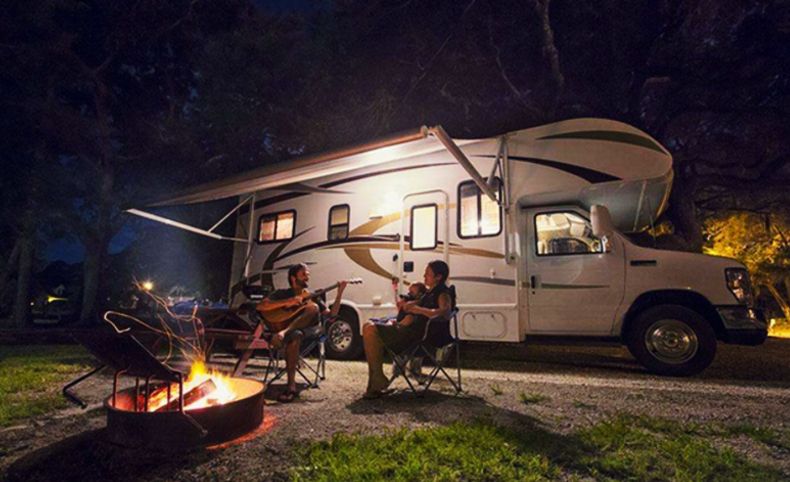Safety is always one of the primary considerations in RV camping. Caravans are usually equipped with kitchens, bathrooms, heaters, cookers, water heaters, and other equipment to ensure that you can enjoy comfort and convenience while traveling. When gas appliances are used in a caravan, there is a risk of gas leakage, such as Carbon Monoxide (CO), Methane (CH4), Propane (C3H8), and so on. And gas detectors can alert you in advance of a possible gas leak or build-up so that you can take timely action to protect yourself and your family. Therefore, gas monitors are crucial safety devices used for RVs, camping, and caravans to protect occupants from potential gas leaks. Installing fixed Carbon Monoxide and combustible gas detectors in your caravan camping can greatly improve the safety of you and your family. With correct installation, regular testing, and maintenance, you can enjoy caravan camping with confidence, whilst remaining vigilant and safe for a safer and more enjoyable outdoor experience.
What are the Dangerous Gases in RV Camping?
Hazardous gases in RV camping mainly include Carbon Monoxide, Methane, Propane, and other combustible gases. These combustible gases can easily lead to poisoning, fire, explosion, and other dangers, so you need to install some gas monitors in your caravan to ensure safety during the journey.
- Carbon Monoxide (CO): Carbon Monoxide is a colorless, odorless, harmful gas that comes from incomplete combustion during the combustion process. In RV camping, Carbon Monoxide may be produced by the incomplete combustion of gas appliances (e.g., cookers, heaters).
- Methane (CH4): Methane is a flammable gas found in natural gas and liquefied petroleum gas (LPG). Cookers, water heaters, etc., used in RVs may produce Methane, and a Methane leak could result in a fire or explosion.
- Propane (C3H8): Propane is also a common component of natural gas, and liquefied petroleum gas (LPG) is used as an energy source and fuel. In RV camping, Propane is commonly used in gas appliances such as cookers, water heaters, and heaters. A Propane leak can also cause a fire or explosion.
- Carbon Dioxide (CO2): Carbon Dioxide is a naturally occurring gas that can accumulate to dangerous levels in confined spaces, especially with poor ventilation. In RVs, elevated CO2 levels can occur due to human respiration, cooking, or combustion of fuels, and may lead to symptoms such as fatigue, dizziness, or difficulty breathing.

GasDog Gas Detectors for RV Camping
Gas detectors for RV camping are essential safety devices that help monitor the air quality inside your RV and alert you to the presence of potentially harmful gases. The following gas detectors & monitors are often used in outdoor RV camping activities.
| Detection Gas | Suitable Detector | Typical Sources in RVs |
| Carbon Monoxide (CO) | GD200-CO, GD500-CO, GD1000-9D, GD1000-824THS, GD1000-S12, GD1000-823THS, GD1000-10D | Incomplete combustion from cookers, heaters |
| Methane (CH4) | GD200-CH4, GD1000-C30W | Leaks from gas appliances (cookers, heaters, etc.) |
| Propane (C3H8) | GD1000-HT3GAS | Gas stoves, heaters, and water heaters using propane fuel |
| Carbon Dioxide (CO2) | GD200-CO2, GD1000-9CW, GD1000-CO2-5, GD1000-BCM01, GD1000-909 | Human respiration, fuel-burning appliances in sealed RVs |
| Oxygen (O2) | GD200-O2, GD700-O2 | High-altitude camping, poor airflow environments |
| Combustible Gases | GD1000-GS91, GD1000-KP816 | Leaks from LPG systems (includes Methane, Propane, Butane, Ethane) |
Gas detectors are an important piece of equipment used for caravanning and camping that continuously monitor the interior of the caravan for the presence of Methane, Propane or other combustible gases. When the gas level exceeds the safe limit, the gas monitors will emit an audible and visual alarm to alert you to potential hazards, allowing you to enjoy your trip while remaining vigilant about gas safety. Before heading out on your RV camping adventure, shop for the right gas detector that best fits your travel needs to help keep you safe throughout your journey.
